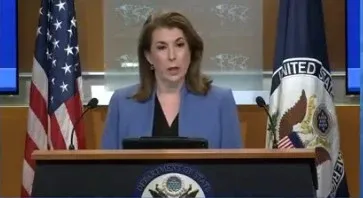What Does the US Urge India and Pakistan to Do Amidst Rising Tensions?

Synopsis
Key Takeaways
- De-escalation of tensions is crucial for both nations.
- Diplomacy is highlighted as the preferred solution over military actions.
- Ongoing communication between leaders is vital.
- The US has condemned violence and called for an end to terrorist support.
- President Trump previously criticized aid to Pakistan due to its actions.
Washington, May 9 (NationPress) On Thursday, the US articulated its dual message to India and Pakistan amidst escalating tensions following the Pahalgam terrorist attack: de-escalate and engage in dialogue.
During the daily briefing, State Department Spokesperson Tammy Bruce referenced US Secretary of State Marco Rubio's discussions with India's External Affairs Minister S. Jaishankar and Pakistan's Prime Minister Shehbaz Sharif earlier that day, emphasizing that the US is concentrating on two key aspects.
"The focus is on preventing escalation and ensuring that communication remains vital. There must be ongoing talks, and silence is unacceptable. The US, naturally, has been deeply involved in dialogues with various leaders from both nations over the past two days," Bruce stated.
She continued, stating, "The overarching message from the Secretary, and indeed from the US as a whole, is that violence must cease. The military approach, as demonstrated in regions like the Middle East, has repeatedly shown that it does not provide solutions, as it yields no end. A shift in perspective is essential. This administration has made it clear that military action and increased violence are not viable solutions; diplomacy is the answer."
When questioned about whether Secretary Rubio proposed mediation, Bruce described the situation as "very delicate and dangerous," adding, "We will refrain from discussing specifics where negotiations are ongoing, preferring to keep these matters private between leaders."
She further explained, "It is crucial to avoid disclosing details to the media while crucial discussions are being conducted discreetly among leaders; we must strive to maintain that privacy."
In response to a question regarding a statement in the readout of Secretary Rubio's call with Prime Minister Sharif, which called for Pakistan to cease any support for terrorism, Bruce remarked, "This is a call we've made for decades in today's world. The dynamics we've observed in the Middle East disrupt lives. The events in Kashmir are tragic, and we have expressed our condolences. The world has collectively rejected such violence, as has the President. At this moment, one thing must stop: the cycle of retaliation and escalation. This is our current focus."
"The Secretary expressed condolences for the reported civilian casualties in the ongoing conflict and reiterated the need for Pakistan to take definitive action to terminate any support for terrorist organizations," Bruce stated regarding Rubio's conversation with Sharif.
The US has not shied away from condemning Pakistan for its backing of terrorism. In a post on X during his first term in 2018, President Donald Trump criticized, "The US has foolishly provided Pakistan with over $33 billion in aid over the past 15 years, receiving nothing but lies and deceit in return, as they perceive our leaders as naive. They provide safe haven to the terrorists we pursue in Afghanistan, with minimal assistance. No more!"










